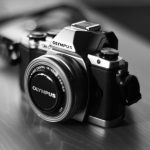As a seasoned photographer, I've had the privilege of using both SLR and digital cameras throughout my career. Each type has its own advantages and disadvantages, and the best choice for you will depend on your specific needs and preferences. In this blog post, I'll share my personal experiences and insights to help you make an informed decision.
**SLR Cameras: Precision and Control**
SLR cameras, also known as single-lens reflex cameras, have been the mainstay of professional photographers for decades. They offer unparalleled precision and control over the image-making process. The optical viewfinder provides a direct and accurate representation of the scene, allowing you to compose and focus your shots with precision. The large sensor size captures more light and produces images with exceptional detail and dynamic range.
**Digital Cameras: Convenience and Versatility**
Digital cameras, on the other hand, have revolutionized photography. They are smaller, lighter, and more portable than SLR cameras, making them ideal for travel and everyday use. The electronic viewfinder provides a real-time preview of your image, allowing you to adjust settings and see the effects instantly. Advanced autofocus systems make it easier to capture sharp images, even in low-light conditions.
**Image Quality: A Fine Balance**
When it comes to image quality, both SLR and digital cameras can produce stunning results. SLR cameras generally have an edge in terms of sensor size and image detail, especially in high-ISO situations. However, digital cameras have come a long way in recent years, and many models now offer image quality that rivals that of SLR cameras.
**Lens Versatility: Customization and Creativity**
SLR cameras offer a wide range of interchangeable lenses, giving you the flexibility to adapt to different shooting scenarios. You can choose from wide-angle lenses for landscapes, telephoto lenses for wildlife, or macro lenses for close-ups. Digital cameras often have built-in lenses, which are convenient but may limit your lens options.
**Cost and Value: Finding the Right Investment**
SLR cameras tend to be more expensive than digital cameras, especially when you factor in the cost of lenses. However, they offer a higher level of customization and control, which can be valuable for professional photographers or serious hobbyists. Digital cameras provide a more affordable entry point into photography, offering a range of features and capabilities at a lower price.
**Personal Experience: A Journey of Evolution**
My photography journey began with an SLR camera, and I spent many years honing my skills with the precision and control it provided. However, as digital cameras evolved, I found myself drawn to their convenience and versatility. I now primarily use a digital camera for my work, while still occasionally using an SLR camera for specific projects where I need the utmost precision.
**Conclusion: The Best Camera for Your Needs**
Ultimately, the best camera for you will depend on your individual needs and preferences. If you demand the highest level of precision, control, and image quality, an SLR camera is a wise investment. If convenience, portability, and ease of use are your priorities, a digital camera is an excellent choice. By carefully considering the factors discussed in this blog post, you can make an informed decision that will empower your photographic journey.

